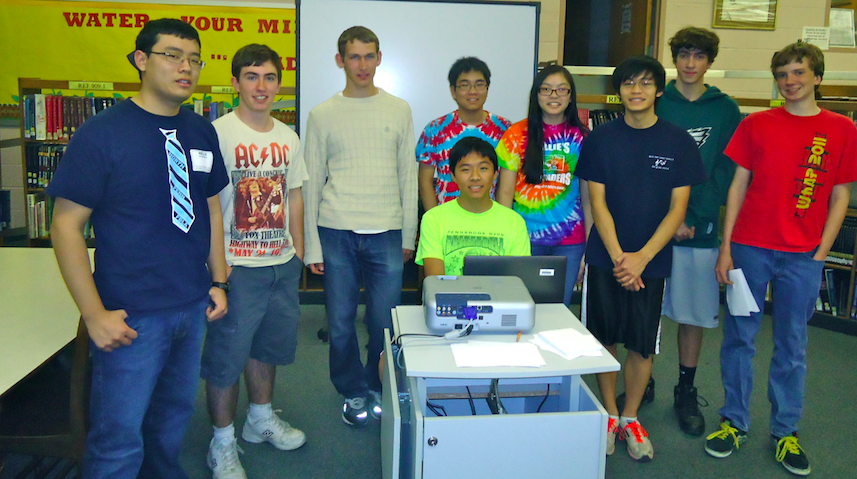The season has just ended for one North Penn team, but instead of putting away the uniforms and sports equipment, they’re putting away the books.
North Penn’s Academic Decathlon team finished the year with a strong performance, placing first in the large school division at the state competition and second overall.
“States was in Eerie. We stayed for three days. The testing spanned two days,” said senior Linda Giang.
“We went up against schools from the other two regions in the state. Going into it, we had the second highest score in the state, but we were behind by a lot. By the end of states, we caught up by a lot of points,” added senior Bob Ni.
For those who are not familiar with Academic Decathlon, Ni explained: “Academic Decathlon is a competition based on ten subjects. Seven are written: math, science, social science, music, language, literature, economics. There are three other subjects that are more subjective like essay, interview, and speech. Essentially, the team is made up of nine members, each of which competes in these ten subjects. The competition is based on the total composite team scores. Depending on that score is whether your team moves on from regionals to states and from states to nationals.”
How are these teams determined?
“The team is divided into three categories: honors, scholastic, and varsity. Honors is known as A. You need to have between a 3.75 and 4.0 GPA. Scholastic is known as B–students with GPA’s between 3.0 and 3.75. And varsity is anything below that. It creates teams that can compete on the same level as others because you have A students against A students, B students against B students. Essentially, we usually have more people than there are spaces on the team, so we have scrimmages. They are usually in the winter. Students with the best scores move on to the team,” explained Ni.
Senior Mikhail Khodak added of the scoring system for the competition: “Basically, each competition is just a series of tests and three subjective. You take them all in a row–each one is a half-hour, multiple choice; each is 50 questions, math is 35. Each person for each subject gets a score out of 1,000. Each person’s individual score is added up. And for each of the subdivisions–the A’s, the B’s, and the C’s–the top two out of the three score for the team. So there are six scores cumulative for the team score and that’s the score that goes against other people.”
In addition to these tests, Khodak explained that this year, students had the opportunity to compete in a Super Quiz Relay Competition.
“You answer questions while everyone is looking at you and basically, it’s multiple choice and you have ten seconds to answer each question—there’s five questions–and each person on the team’s score in combined. Not just the top two. There’s a separate trophy for that,” he said.
“The Super Quiz is usually either the science subject or the social science. This year it was social science,” added senior Gary Li.
Ni and Khodak are both four-year team members, while Li and Giang are both members for the first time.
Not just successful as a team, the group had many individual successes at the state competition.
“We had three individual medalists. Bob got first in the state, I got second, and Patrick Nicodemus–a junior–got third C. Bob and I are A’s. Everyone on the team medaled, I think, in specific subjects. Gold, silver, and bronze medals are awarded in each subject based on your school’s division–large schools, small schools, and medium schools,” said Khodak.
The team’s second place overall finish just barely missed a trip to nationals, but the state competition was not the end of their season. At the end of April, the students competed in an online competition, E-Nationals, where they faced other teams who placed first in the large school division of their state, but not first overall.
The results from this competition will be released in either May or June, though the students were unsure of the exact date.
For some students who compete in the competition, summer will mark the beginning of next year’s season and studying from sanctioned US Academic Decathlon materials will become part of their routine.
For North Penn students, much of the season is spent helping their teammates learn, in addition to studying.
“Most of it is studying the packets that contain most of the information in a really condensed form. There are also supplemental study guides that we study. During meetings, we have one person go up and teach a subject. We try to help each other out by teaching subjects that others aren’t necessarily as good at,” said Ni.
“A lot of other schools take this as a class, which is really unfair,” joked Li.
With these seniors graduating in June, all four encouraged “fresh blood” to come out for the team next year.
“You don’t need good grades to do Academic Decathlon. That’s the first misconception. We need really strong C’s and B’s, essentially people who are incredibly smart, but don’t necessarily do well in school,” said Ni.
Khodak added: “It’s a lot of work if you are willing to make the commitment.”
With all their success this year, the hard work and commitment has definitely paid off.

